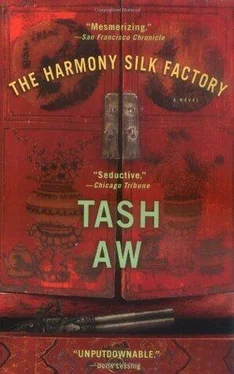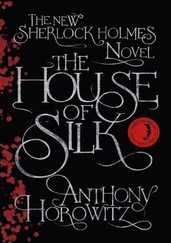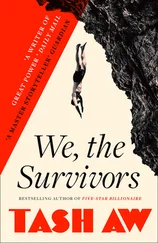1 ...6 7 8 10 11 12 ...83 You would never have guessed that in his spare time he was also the commander of the Communist Army for the whole of the Valley.
By the time Johnny came under his employ at the Tiger Brand Trading Company, Tiger Tan’s life seemed, in every respect, a settled state of affairs. He appeared, after many years, to have laid to rest the unfortunate events relating to his short, sad marriage. His wife had left him very soon after they had married. She took their baby daughter with her and converted to Islam in order to become the third wife of the fourth son of the prince regent of Perak. She went to live in the teak palace on the gentle slopes of Maxwell Hill, and it was there that the child was raised, amidst the splendour only royalty can provide. The child was given an Arabic name, Zahara, meaning “shining flower,” though neither her name nor her hardy peasant-Chinese blood could save her from dying of typhoid when she was seven years old. After her death, her mother was sometimes glimpsed at the great shuttered windows of the palace singing old Chinese love songs at the top of her voice. She sang with perfect pitch, her tongue capturing the words and releasing them across the Valley like grass seeds in the wind. If you strolled along the path which ran along the grounds of the palace you could sometimes hear these songs:
A traveller came from far away,
He brought me a letter.
At the top it says “I’ll always love you,”
At the bottom it says “Long must we part.”
I put the letter in my bosom sleeve.
Three years no word has faded.
My single heart that keeps true to itself
I fear you’ll never know.
It took Tiger a full twenty years, perhaps more, to forget the pain of his wife’s desertion. At first, he spent every waking hour trying to convince himself that both his wife and child had died; he told himself over and over again that they had travelled to distant lands and perished on their journey. As the months went by he began to believe it. All his friends, all the people who came to his shop — none of them mentioned the fate of his young family. They could see his suffering and did not wish to add to it. They understood that the human mind is a strange creature. Unless it is reminded of something regularly, it gradually forgets about that thing. In that way we may forget about the most terrible things that happen in our world. Little by little, Tiger’s memory began to lose its imprint of his wife and baby daughter until, truly, they ceased to exist in his world.
All that had happened a long time before Johnny showed up at his shop. Tiger’s life had long since become settled. His business had been flourishing for many years, and now he began to sink more and more into the comfort of his home, a modestly sized but comparatively luxurious stone-and-teak house on the outskirts of the little town. He filled it with exotic furniture — Portuguese chairs from Melaka, English pine tables treated with wax to protect against the humidity, painted chests of drawers from “Northern Europe.” He had a formidable collection of books too. Marxist texts in Chinese, mainly, but also a number of English-language books, including a small collection of Dornford Yates novels.
In his spacious garden there was a small orchard. He tended to his fruit trees with great care. He especially loved the mango trees for their dark tongue-shaped leaves, which kept a thick shade all year round, even when the fruit was in season. Of all the fruits, however, he loved the rambutan best, and the ones he grew were considered particularly fine: deep red in colour and not too hairy. He took these down to the market, where he sold them wholesale. The few cents he made from this gave him as much pleasure as the hundreds of dollars he made each month from trading textiles and clothing, and so he began to devote more time to his garden. He pruned the trees so that their shapes would become more attractive and their new branches more sturdy; he agonised over which trees to use for grafting new stock; he tied paper bags over the best fruit to protect it from flying foxes and insects.
For Tiger, it turned out to be perfect timing that, just then, a strong, hungry-looking young man came asking for work at the Tiger Brand Trading Company.
When Johnny first arrived in town, he did what he always did. He drifted into the nearest coffee shop and had a glass of iced coffee and a slice of bread with condensed milk. He asked the shopkeeper for work — there wasn’t any. Coffee shops were usually poor sources of work, for they were almost always small enough to be run by the members of a single family. Out on the street, he stopped a few people and asked them where they thought he might find work. All of them echoed what the coffee shop keeper had told him: “Tiger Tan’s well-known shop,” they said, pointing at a large shop house in the middle of a terrace on the main street. It was a busy-looking place which seemed to be full of expensive, high-quality merchandise. He realised, as he approached the shop, that fine red dust had settled all over his clothes during his three-hour journey from Tanjung Malim.
“I’m looking for work,” he said to a girl unloading fat bales of cotton from a lorry.
The girl jerked her chin in the direction of the shop. “Ask boss,” she said.
Johnny hesitated before going in. The shop smelled clean and dustless. There were many customers inside, and there was laughter and a rich hum of voices, punctuated with the click-clack of an abacus.
“Yellow shirt, over there,” the girl said as she pushed past Johnny.
Johnny looked over to a darkened corner. A neatly dressed man sat quietly in front of a pile of papers and a small money box. He had kicked off his shoes and was sitting with one ankle resting on the knee of the other leg. Every few seconds he lifted his chin and fanned himself with a sheaf of papers. His hair was combed and brilliantined.
“I want work,” Johnny said simply. “I am a labourer.”
Tiger looked at him hard, assessing him quickly. After all these years he had become a sharp judge of character. It was well known that Tiger could see things in you that you might not have realised yourself.
“What’s your name?” he asked Johnny.
“Lim.”
“Where are you from?”
“Nowhere.”
“What do you mean, nowhere? Everyone comes from somewhere.”
“I mean, I don’t know.”
“Okay — where have you just arrived from?”
“Tanjung Malim.”
“Before that?”
“Grik — and before that Kampung Koh, Teluk Anson, Batu Gajah, Taiping.”
“That’s a lot of places for a kid like you,” Tiger said. This boy looked perfectly ordinary to him — no distinguishing physical features, nothing unusual in his behaviour. He could have been any one of the young drifters who turned up at the shop from time to time. And yet there was something curious about this particular one, something which, unusually, Tiger could not put his finger on. “Tea?” he said, offering Johnny a chair.
Johnny sat down, his baggy shorts pulling back slightly to reveal hard, gnarled knees crisscrossed with scars.
“Of all the jobs you did,” continued Tiger, “which one did you work at the longest?”
“Yeo’s plantation.”
“Near Taiping?”
“Yes.”
“Yeo’s pineapple plantation, right? The boss is Big-Eye Chew — that one?”
Johnny nodded.
A small smile wrinkled Tiger’s eyes. “Why did you like it?”
“I liked the other workers,” Johnny said, looking at his reddened, dust-covered canvas shoes. “I liked the way they lived. Together. The bosses too.”
“I know that camp well.”
“The workers there were like me. But I couldn’t stay. I had to go.”
“Why?”
Читать дальше
Конец ознакомительного отрывка
Купить книгу












